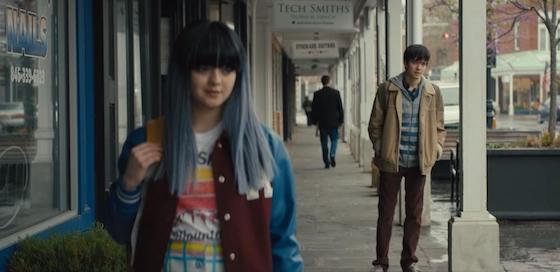

[Rating: Minor Rock Fist Down]
The Urban Dictionary defines Manic Pixie Dream Girl as, “a pretty, outgoing, wacky female romantic lead whose sole purpose is to help broody male characters lighten up and enjoy their lives.” Then Came You, opening this week, presumes that people either don’t know about this trope, or don’t hate it enough to despise a new movie defined by it: neither of which is true.
A schmaltzy amalgam of the dying-love romance genre, Then Came You is little more than a giant bag of tricks assembled to manipulate its viewers into feeling something for broad characters inhabiting a cliché narrative. This is, after all, a story everyone has seen before, using character tropes that are so tired and played out that they’ve already got an Urban Dictionary entry. It’s little surprise, then, that this movie is about as fresh as last week’s lettuce and wastes a gaggle of talented actors on a story and script that would get a C- in a freshman screenplay seminar.
The set-up is fairly straightforward: Calvin (Asa Butterfield) is a perfectly healthy hypochondriac who’s sure he’s dying of something despite all of the tests and doctor’s visits saying otherwise. Calvin wallows in a self-spun cocoon of dread, and only begins to snap out of it when he meets Skye (Maisie Williams) at a cancer support group. Skye really is dying, yet she’s full of exuberant joie de vivre that breaks through Calvin’s shell and pushes him to Live with a capital “L.” He helps her cross things off her bucket list while she pushes him to experience new things, allowing both to learn more about each other along the way.
Sigh…it’s draining just writing up that wrung-out, exhausted synopsis, so imagine the pain of having to actually endure this. It’s easy to see the turns coming a mile away in Then Came You, what with the depressed young man getting a new lease on life via a vibrant woman whose time will soon come to an end. To get at this, the script doesn’t make any pretense about just jamming these two characters together by the most tenuous of contrivances (Skye meets Calvin and immediately decides that they need to be best friends). The two don’t have anything in common, aren’t established as characters when the story starts using them, and never develop anything resembling a genuine connection despite all the cutesy scenes setting up their “bonding.”

This makes the movie doubly frustrating, for a hackneyed, played-out story might have been of casual interest if Then Came You made any attempt to inject the characters or set-up with even a shred of originality. Sadly for audiences, it didn’t. As the film moves into its second act, the script mercifully peels back some of the layers of its leads to establish some semblance of individuality, showing that Skye (gasp!) isn’t as confident and blithe as she lets on, and that Calvin’s hypochondria is connected to deeper family trauma. Fergal Rock (no relation to Fraggle) wrote the script for Then Came You, though it feels less like writing and more like a Frankenstein-esque assemblage of pieces from older, better films. The basic narrative beats are lifted straight from Harold & Maude, with just a little Sweet November, Garden State, Love Story, and Me, Earl, and the Dying Girl thrown in for ballast.
Nothing anyone says crackles with a spontaneity or true-to-life rhythm that resembles real conversation, feeling instead like recycled banter from old Friends reruns. Ken Jeong and Tituss Burgess appear briefly in supporting roles that are utterly wasted on them, with the latter sleepwalking through his lifeless dialogue while the former has to ham it up as a goofy cop. It’s just sad, really. There’s a talented cast, here, and competent crew behind the scenes giving Then Came You a polished, professional look with slick camera moves, set designs, costumes, and even editing. Butterfield and Williams do fine work in the lead roles and elevate this repackaged tragi-rom-com bluster wherever possible, yet they aren’t a match for the basic AF screenplay.

Director Peter Hutchings does a decent job keeping the pace of the picture brisk, moving the story along at a tolerable clip, and there’s an earnestness beneath the surface that gives one the impression that everyone involved meant well, here. It’s just not enough, though. The ancillary characters in the story act as little more than props to move the emotional thesis of the movie forward, with Calvin’s love interest, Izzy (Nina Dobrev), a notable casualty in this regard. The script positions Izzy as something of a character thermometer: gauging the “progress” Calvin is making due to his association with Skye. As a narrative technique it is lazy, but is made more so by virtue of the fact that Izzy isn’t developed or established as a character outside of her association with Calvin.
Perhaps it is because its target demo is a YA crowd that might not have seen any of this before, but Then Came You seems content to just trample over story beats and characters that don’t offer anything new to the formula, opting instead to just lean hard into the Manic Pixie Dream Girl trope. Stale dialogue, hollow characters, and a one-note premise more or less sink this one before it leaves the harbor: leaving a gaggle of talented actors and crew in its wake. Fans of Butterfield and/or Williams might find some small enjoyment seeing the pair bounce off of each other in a more humorous setting than their more high-profile work, yet there are few selling points for the film outside of this. Like the cancer eating away at Skye, the diagnosis for The Came You is grim, nay: terminal.





Comments on this entry are closed.